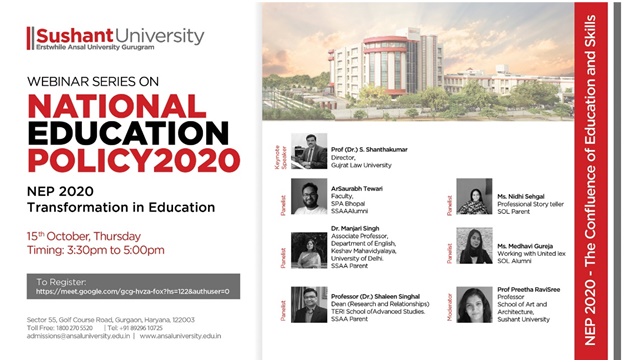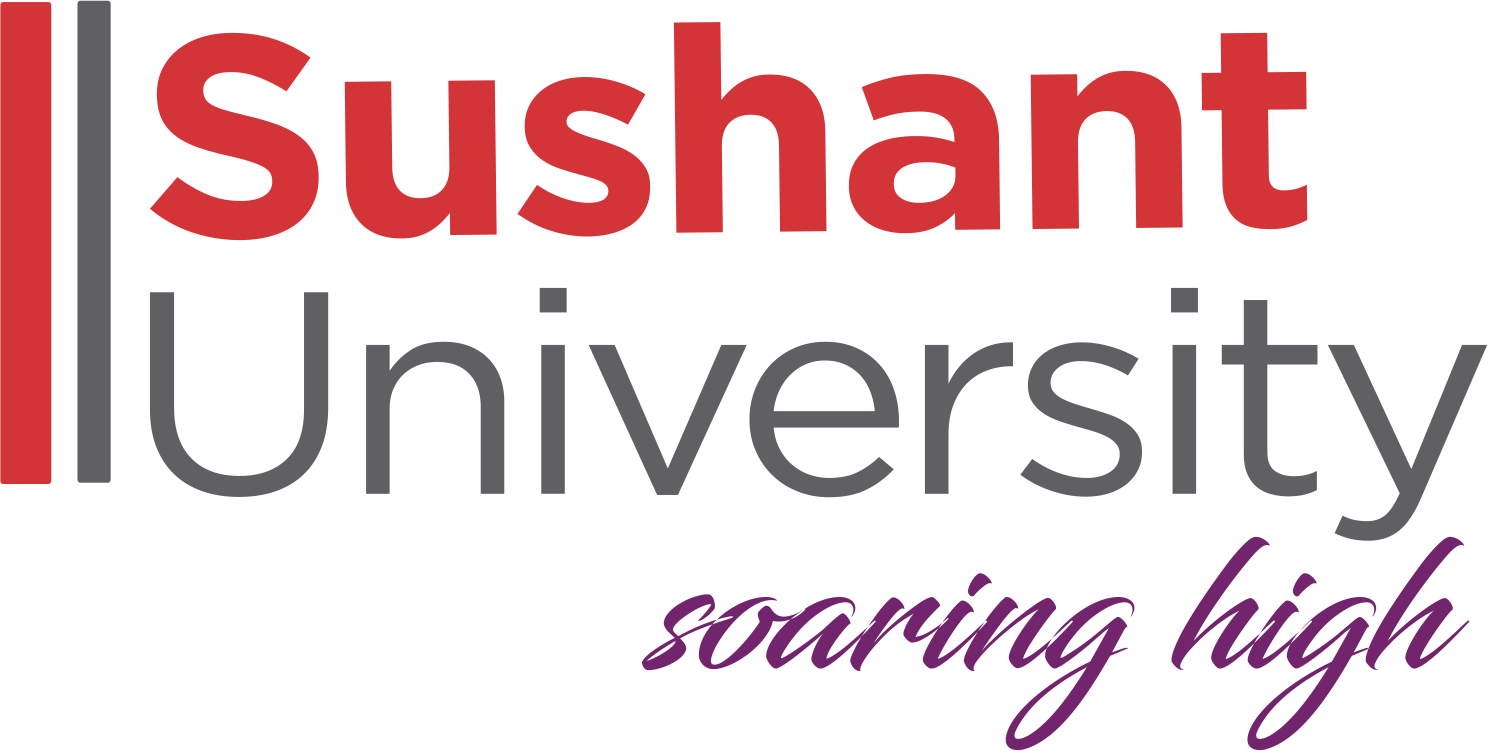Transformation in Education

“A society which is able to look deep into its past can look far into its future”
As the fourth webinar in the series named NEP 2020 – The Confluence of Education and Skills, the theme was ‘Transformation in education’, which was participated by eminent thinkers, philosophers and theorists. Given below is the report on the same:
PROF SHANTHAKUMAR – Director, Gujarat National Law School
Talking about the 3rd NEP, prof Shanthakumar said that the last EP was formulated in the year 1986 and after 34 years we really needed to have an introspection and improve upon the existing paradigm. “India will have the highest population of young people in this world over the next decade and our ability to provide highest educational opportunities to them is certainly going to determine the future of our nation. By 2040 we have to have an education policy which is 2nd to none.” He emphasized greatly upon the truth that education should be accessible to all learners regardless of their social or economic backgrounds.
“The vision is to create an education system which is rooted in the Indian Ethos that contributes directly to transforming India and making India a global knowledge superpower.” He said. The education systems must develop amongst students a deep love for the constitution. To create one’s roles and responsibilities in a changing world, thus making them truly global citizens. Equitable quality education to promote lifelong educational learning opportunities for all is what the NEP also proposes. All the targets and goals set for 2030 can be achieved, we just need to re-configure the entire education system.
Demand for a skilled workforce will be in greater proportions. Children must LEARN HOW TO LEARN, how to think critically and to solve problems. The education should be less on content but more on application. “Students should learn on how to innovate, adapt and to absorb new concepts and pedagogy must evolve to make education more experiential, holistic, integrated, inquiry driven, discovery-oriented, learner-centered, discussion-based, flexible, and, of course, be enjoyable.”
Education must not limit itself on making the learner a literate person but should also build character, enable learners to be ethical, rational, compassionate and caring while also preparing them for a gainful and a fulfilling employment. The gap between the current state of learning outcomes and what is required must be bridged through undertaking major reforms that bring the highest quality, equity and integrity into the system from the early childhood care and education through the level of higher education.
This policy proposes the revision and the revamping of all aspects of education including its regulation and governance to create a new system that is aligned with the aspirational goals of the 21st century education while building upon India’s traditions and value systems.
Teachers must be positioned as epicenters of all educational reform systems and should be looked upon as the most essential and respected members of our society as these are the people who are going to shape our next generation.
NEP recognizes that education is a great leveler and prepares the students not only for a job but also to make them as logical thinkers. It aims at producing engaged, productive and contributing citizens.
Dr. Manjari Singh – Associate Professor Department of English, Keshav Mahavidyalaya, Delhi University started by talking about the Cornerstones of education as 1) Learning to know 2) Learning to do 3) Learning to be 4) Learning to live together.
The NEP attempts to incorporate three personal goals, pedagogies and outcomes. We need to bring the human quotient back to inculcate knowledge, skills, values and agility. It envisages to transform universities into large multi-disciplinary universities, colleges and higher education clusters and knowledge hubs. Its increased emphasis on research and critical thinking will help learners to focus on the application of a few core concepts rather than learning by the route of a vast syllabus and encourage them to become motivated learners. This is on the lines of our ancient universities Takshashila and Nalanda which were great hubs of learning. A society which is able to look deep into its past can look far into its future. “The multiple exit and re-entry options will lead to a liberal education in the future and save our youth from the unnecessarily running after redundant degrees. Furthermore, the establishment of the Academic Credit Bank which will store the academic credits of the students which they can redeem by following courses from several higher education institutes.” She said The NEP proposes India as a global study destination which can provide premium education at an affordable cost an even well performing Indian universities will be allowed to set up in different countries of the world.
A National Education Technology Forum will be created for free exchange of ideas on the use of technology to enhance learning, planning and administration.
NIDHI SEHGAL - Professional Storyteller for 3-8 Years.
Education is not about loading the child with information. All students, especially at their adolescent age should be subjected to Mental Health check-ups. The psychological well-being of the student is to be appreciated. NEP envisages covering the primary age students as well, which is something new.
The young age time is crucial for the development of the mental faculties of the child. His/her mind can be programmed for adulthood challenges. Human mind starts thinking emotionally and rationally, right from the childhood, the child undergoes progressive stages of development.
In South Korea the psychological report cards are done many times and reported to the parents for the psychological analysis of children there. In this way the emotions and the emotional needs of the children are taken care of. If this is also implemented in our country, we will be able to take care of many things concerning the child development. With the emphasis on marks, personal and domestic issues, anger management, forcing subjects, parents’ pressures, it is difficult to explain what the children are going through. Very complex emotions are involved here. this policy is also focusing on the emotional wellbeing also. NEP is going to put the education system at par with the global systems and that is a big gift.
PROF DR SHALEEN SINGHAL – Teri School of Advanced Studies.
NEP is enhancing ourselves from literacy to enlightenment. Here we are aiming to consume the knowledge. We need to do our homework to derive the best from the changes which are likely to happen keeping in mind the aspiration to make India the Knowledge power.
By means of Multi-disciplinarity – you develop and acquire command on you own disciplines. We have to look at the ingredients of the inputs and check what the background is all about. To what extent is the value-addition coming. It is important to focus on how this new NEP will be implemented and what are the indicators of a good implementation. Policies should be implemented for success. We will need to be conscious about some impact indicators. We have to create a student-centered learning. It is extremely important that we learn beyond our domain knowledge and that’s what the trans-disciplinary learning will teach us. We have to look at the cognitive aspects about who our students are, are they UG PG or KG? She sighted a quote on Mahatma Gandhi – Sustainability would come a full circle only if the indigenous knowledge and circumstances are fully acknowledged and realized.
MADHAVI GUREJA – Graduated from AU- SOL.
NEP 2020 is designed to balance the local and global human resources. It focuses in augmenting the individual capacities and in achieving excellence in the choice of programme by providing customable disciplines and maintains social inclusivity. There is a significant focus on skill-based learning. Technical education are being introduced at secondary and post-secondary levels. We are poised to become close to the international standards. Ministry of resource development has transformed into the Ministry of Education. NEP is aligned to the 21st Century Needs. It is the implementation of the process where lies the key to success.
SAURABH TEWARI – alumnus of SSAA.
NEP has outreach to the poorest of the poor. Corporates too have a role to play in it. Pandemic is a blessing in disguise as we are able to examine the pros and the cons of online education now. And also what can be done on campus and on the online mode. There will be a hybrid system and there will be a mix of offline and online modes. It will increase the capacity at the higher education levels.
The interdisciplinary aspect allows better scopes of understanding of other disciplines. Cross-pollination of the existing verticals. Technology will replace the human agency in the job sector the challenge is to address future crises. Opportunities in the higher education institutions – to subsidize and yet sustain innovation in pedagogy. This will pragmatize innovation in pedagogy. NAYI TALEEM – offers a choice of inter-disciplinary engagement as it offers more on learning than on education.
A panel discussion was a new feature of this webinar as the presenters were also performing the roles of parents and expressing views from their sides.
Upon being asked about the Education for All policy of the NEP, its quality and affordability was a matter of concern, especially as most of the players, especially the private universities were treating education as a business enterprise. this is a prospective that should change. Prof Shanthakumar said that CSR funds of some of the renowned indian MNCs should to be used in setting up and in funding universities. Private but government aided schools should not be charging high fees. All this requires a holistic change of perception as the universities should not be allowed to follow a business model – that should not be the case. Private universities are catering the elite class, which should not be the case. That should change. Public institutions are also charging high they should change the perspective. Education should be a matter of charity. Money should be spent on students.
The Government should not promote autonomous institutes, which are proliferating and creating a rat race, where the entire burden is being shifted to the student. High-price private education to be checked what education they are providing. Parents must know what they are paying for.
Talking from a parents’ perspective it was generally opined that the new NEP will take time. We in India have multiple countries in our own country. This NEP cannot change us much as parents as we have age-old typical parenting qualities.
The NEP’s allowance for a student to change the domain at a very early level is a welcome step so that he/she is not stuck in case programme is not liked.
Prof Shanthakumar - NEP does not say much about parents or about parenting. There is, therefore a pressing need to do something like Parents’ Development Programmes. Such fantastic literature is available in parenting but how many parents have made us of them? Universities can allow flexibility, but what about parents? They do not allow much of flexibility. We need to improve the culture of parenting in India. Monitoring of a students’ mental health is more required.








